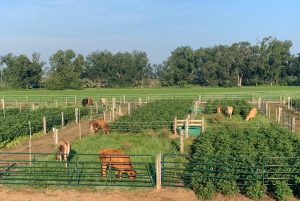The UF/IFAS-Embrapa Collaborative Climate Change Research Fund is backing a study on integrated crop-livestock systems (ICLS). Embrapa is the state-owned research corporation affiliated with the Brazilian Ministry of Agriculture. The study aims to explore how ICLS can improve soil health and mitigate the risks of climate change. Dr. Nikolaos Tziolas, assistant professor of soil science artificial intelligence in the UF/IFAS department of soil, water, and ecosystem sciences (SWES), is leading the effort. Others on the team include:

crop-livestock system.
Photo by Dr. Erick Santos
- Dr. Clyde Fraisse, professor in the UF/IFAS department of agricultural and biological engineering
- Dr. Jose Dubeux, professor at the UF/IFAS North Florida REC-Marianna
- Dr. Sarah Strauss, SWES associate professor at the UF/IFAS Southwest Florida REC
They will investigate the connections between sustainable agricultural practices and crop insurance policies. The project is a collaboration with EMBRAPA-Brazilian Agricultural Research Corporation, involving researchers from four different departments. It builds upon research underway at the UF and Embrapa, with additional contributions from the University of São Paulo.
Climate Change and Agriculture
As extreme weather events become more common, agricultural production faces increasing uncertainty. Current estimates suggest that climate change has already led to an additional $27 billion in crop insurance costs over the past three decades in the United States.
“The financial risks are only expected to rise, along with the environmental risks,” said Dr. Nikolaos Tziolas, highlighting the urgency of the study.
Crop insurance has traditionally served as a safety net for farmers, but the existing system may not be equipped to handle the challenges of a warming climate. The focus of the project is to adapt crop insurance to promote sustainability.
“The current system can discourage farmers from adopting cover crops and sustainable practices,” explained Dr. Jose Dubeux.
Instead of supporting diverse farming systems that improve long-term soil health, traditional insurance tends to favor conventional monoculture. The team aims to shift this focus by integrating soil health indicators into new insurance models. This promotes practices like integrated crop-livestock systems, which increase farm resilience.
Index-Based Insurance
The researchers are particularly interested in index-based insurance (IBI). It uses environmental indicators, such as rainfall data and soil properties, to determine compensation. Unlike traditional insurance, IBI offers faster payouts without costly farm visits and reduces the administrative burden on farmers.
Dr. Fraisse, who has conducted extensive research on IBI, explained, that “we aim to investigate whether incorporating soil parameters such as moisture and texture, could enhance the accuracy and responsiveness of insurance models.”
This approach could lower premiums for farmers who adopt sustainable practices, incentivizing widespread change.

UF/IFAS Photo taken August 2024
Focus on Soil Health
To test this new insurance approach, the team will build on existing trials in Florida and Brazil. Researchers will examine how ICLS, including rotations between grain crops and pasture, impact soil health. Florida’s subtropical site includes oats and crimson clover integrated into peanut-cotton rotations. The Brazilian tropical site has monitored no-till systems and continuous pasture since 2006.
“We want to quantify how these systems affect soil carbon and other health indicators,” said Dr. Dubeux.
The study will measure soil enzyme activity, soil organic carbon, and moisture retention to evaluate soil health under ICLS. These metrics will provide essential data to develop a refined IBI model that incorporates soil characteristics alongside weather data.
“This should give us a comprehensive view of agricultural risk,” explained Dr. Tziolas. “The goal is to see if healthier soils can actually reduce yield losses during extreme events like droughts.”
Harnessing Technology for Better Risk Management
The project will leverage cutting-edge GeoIntelligence technologies, combining satellite data with on-the-ground measurements. Using AI and Earth Observation tools, the researchers plan to map soil health and predict risks with greater accuracy.
“By integrating satellite data with soil observations, we can create a more nuanced and accurate assessment of risk,” explained Dr. Fraisse.
This approach could offer a powerful tool for both farmers and policymakers, enabling quicker responses to climate-related challenges.
By the end of the project, the team hopes to lay the groundwork for broader adoption of sustainable farming, based on data-driven technologies that enable informed, effective decision-making in the United States and Brazil. Making soil health a core component of crop insurance models should lead to both economic and environmental benefits.
“We believe this research can help farmers better adapt to the changing climate while maintaining profitable and productive systems,” said Dr. Strauss.
The two-year integrated crop-livestock systems project will begin in March 2025.
Featured image by Thomas Wright, UF/IFAS photographer.
 0
0
